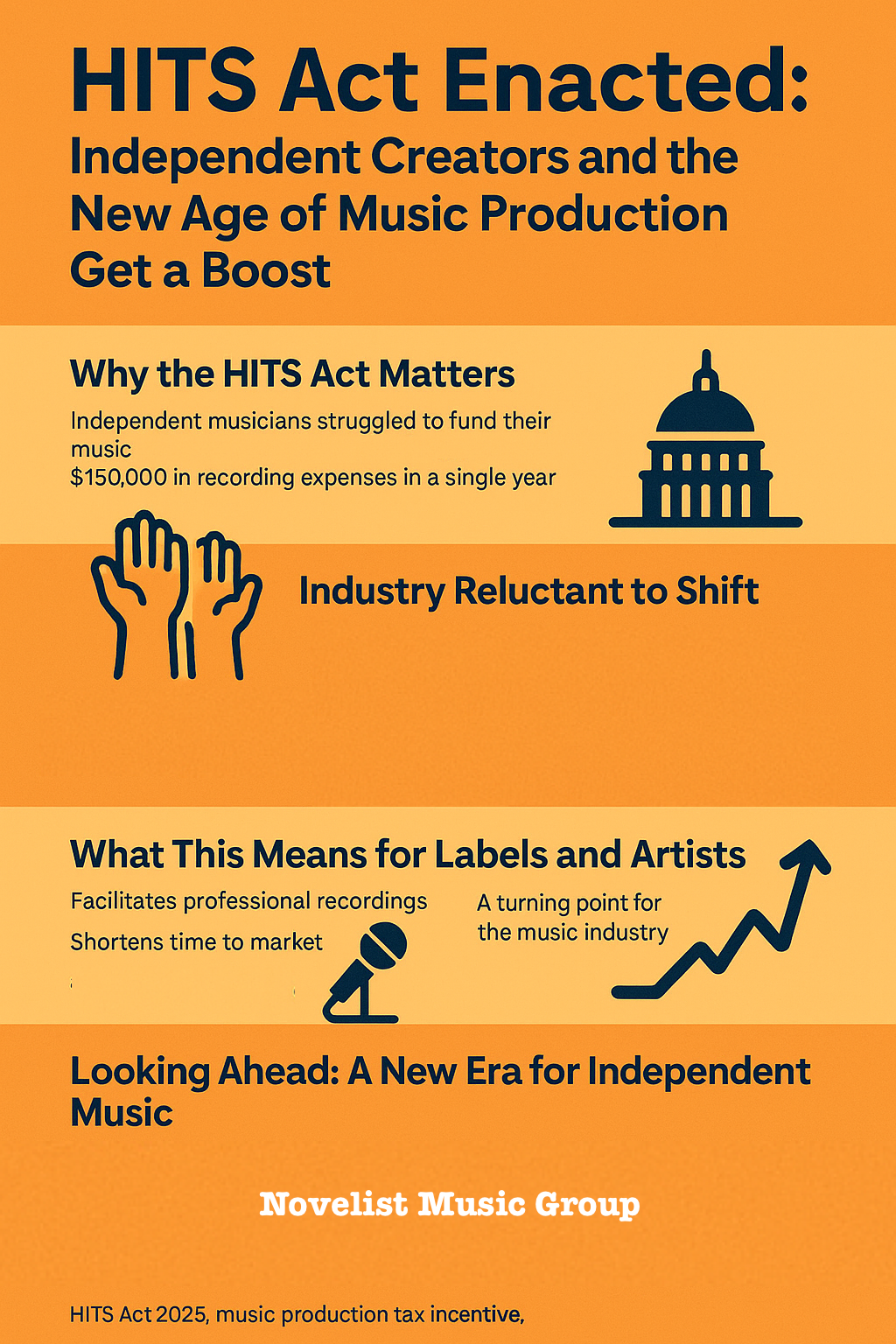Industry News: Why the HITS Act 2025 is a Lifeline for Independent Music Creators
HITS Act Passed — A Monumental Win for Music
Game-Changer: Why the HITS Act 2025 is a Lifeline for Independent Music Creators
📜 HITS Act Passed — A Monumental Win for Music
The HITS Act, officially enacted in 2025, is finally reality — delivering the tax reform independent musicians have been fighting for. This landmark legislation allows artists to deduct up to $150,000 in recording expenses in the same year the costs are incurred, instead of spreading them across multiple years. That’s not just paperwork relief — it’s a full-on revolution for creatives.
🎧 What is the HITS Act and Why Does It Matter?
The HITS Act, or Help Independent Tracks Succeed Act, was designed to correct a long-standing financial barrier in the U.S. tax code. Previously, recording expenses — including studio rentals, mixing, mastering, and session musicians — had to be amortized. This disproportionately hurt indie creators, who don’t have the deep pockets of major labels.
With the HITS Act, creators can now:
📊 Infographic: Key Highlights of the HITS Act
Write off large portions of their production budget immediately.
Accelerate their releases with upfront financial relief.
Retain more earnings to reinvest in future projects.
🎙️ Real Impact on Real Artists
“Before the HITS Act, we had to delay projects because of cash flow,” says indie artist Carla Mendes. “Now, I can release my EP in one year and get tax relief in the same year — that’s life-changing.”
Labels and music groups, especially small ones, are also celebrating. Tax deductions on production costs mean more room for:
Talent development
Creative risks
Sustainable touring schedules
📈 Long-Term Benefits: Industry, Equity, and Growth
The HITS Act could mean:
Benefit
Enhanced cultural output
More unique voices breaking through mainstream filters
Level playing field for artists from diverse and underfunded groups
Impact
Faster production timelines
Less red tape and more agile releases
Greater equity in the industry
Quotes from Industry Leaders
“This is a historic victory for independent music creators.”— Richard James Burgess, CEO of A2IM
“We fought hard for this — and now, indie artists can breathe.” — Harvey Mason Jr., CEO of The Recording Academy
🧭 Looking Forward: What’s Next for Indie Creators
While this act is a massive step forward, ongoing advocacy is needed to:
Ensure creators are aware of their eligibility
Push for similar tax support in touring, merchandising, and distribution
Promote diversity in funding access
❓ Frequently Asked Questions (FAQs)
1. Who qualifies for the HITS Act?
Anyone who produces sound recordings — from solo artists to small indie labels.
2. What expenses are eligible?
Studio time, producer fees, session musicians, mixing/mastering, and related production costs.
3. How is this different from previous laws?
Before, artists had to deduct expenses over many years. Now it’s the same year.
4. Can I apply it to past expenses?
Only for costs incurred in or after 2025.
5. What if I work part-time or have another job?
As long as your recording income is reportable, you’re eligible
6. Where can I get help with my taxes?
Work with a CPA familiar with entertainment law, or visit Recording Academy’s Advocacy Resources.
Conclusion: A New Era for Independent Music Has Arrived
The HITS Act 2025 doesn’t just tweak a tax code. It rewrites the rules of independence, giving artists a voice, a budget, and a business framework. If you’re an indie creator, this is your time. Record. Release. Rejoice.
Bookmark www.NovelistMusicGroup.com for more information and to hire for services


